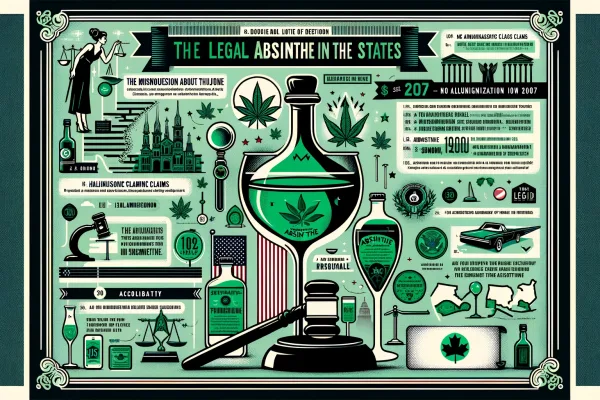Absinthe, often shrouded in mystique and controversy, has long been a subject of legal and cultural fascination in the United States. Known as “The Green Fairy” for its distinctive hue and purported mystical qualities, absinthe’s legality has ebbed and flowed throughout history, mirroring changing societal attitudes towards alcohol regulation. As an attorney with expertise in food and beverage law, I aim to dispel myths and provide a clear, objective analysis of absinthe’s legal status in the U.S. today.
The Historical Context of Absinthe in the U.S.
Absinthe’s journey in the United States has been tumultuous, marked by periods of widespread popularity, followed by prohibition and eventual re-legalization. Originally developed in Switzerland in the late 18th century, absinthe became popular in Europe and the United States in the 19th and early 20th centuries. However, concerns over its psychoactive properties—attributed to the compound thujone, found in one of its key ingredients, wormwood—led to a widespread ban.
The Ban and its Underpinnings
In the early 1900s, absinthe was banned in many countries, including the United States, due to its alleged harmful effects. The ban was largely fueled by the temperance movement and emerging studies that suggested absinthe’s high alcohol content and thujone levels could lead to hallucinations and mental deterioration. In 1912, the U.S. Food and Drug Administration (FDA) prohibited the manufacture, sale, and importation of absinthe.
The Modern Legal Landscape
The turning point for absinthe in the United States came in the early 21st century, when new research and revised regulations began to challenge the century-old ban. It was discovered that historical absinthe contained far less thujone than previously thought, and its psychoactive effects were exaggerated.
Re-Legalization and Regulations
In 2007, U.S. regulations were amended to allow the sale of absinthe, with certain conditions:
- Thujone Content: Absinthe sold in the U.S. must be “thujone-free,” containing less than 10 parts per million of thujone.
- Labeling and Marketing: Labels and marketing materials must not make any claims about hallucinogenic, psychoactive, or mind-altering effects.
- Alcohol Content: Like other spirits, absinthe must adhere to regulations regarding alcohol content, typically not exceeding 55-75% alcohol by volume (ABV).
These regulations effectively lifted the ban on absinthe, permitting its legal production, sale, and consumption within the United States, provided it complies with the stipulated guidelines.
State-Specific Considerations
While absinthe is legal at the federal level, state laws can impose additional restrictions on alcohol sales and distribution, affecting how absinthe is marketed and sold. It’s crucial for producers, retailers, and consumers to be aware of and comply with both federal and state regulations.
Absinthe Today: Enjoying “The Green Fairy” Legally
Today, absinthe is available in many bars, liquor stores, and restaurants across the United States, enjoyed by those who appreciate its unique flavor and storied history. Consumers can enjoy absinthe in traditional ways, such as the classic French method, which involves dripping water over a sugar cube into a glass of absinthe, or in various cocktails.
Navigating Misconceptions
Despite its legalization, misconceptions about absinthe’s legality and effects persist. It’s important for enthusiasts and the curious alike to rely on factual information and understand that legal absinthe, while potent in alcohol content, does not contain hallucinogenic properties.
Conclusion
In conclusion, absinthe is not illegal in the United States, provided it meets specific regulatory requirements concerning thujone content and labeling. The spirit’s re-legalization reflects a broader trend towards reevaluating and, in some cases, overturning historical prohibitions based on modern scientific understanding and regulatory frameworks. Whether you’re a connoisseur of fine spirits or simply intrigued by absinthe’s rich history, you can now legally explore “The Green Fairy” within the bounds of U.S. law. As with all alcoholic beverages, responsible consumption is key to enjoying absinthe’s unique characteristics and its place in the tapestry of American beverage culture.









Leave a Reply